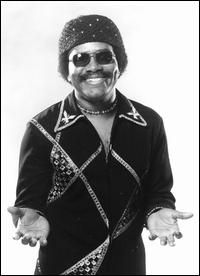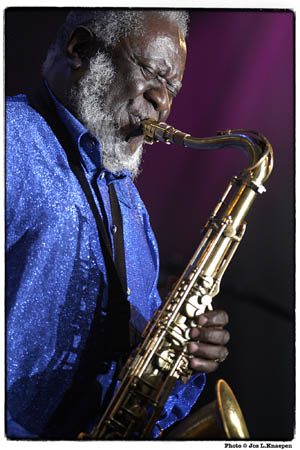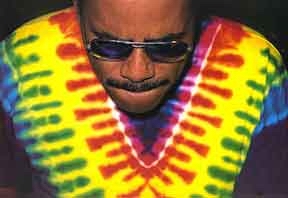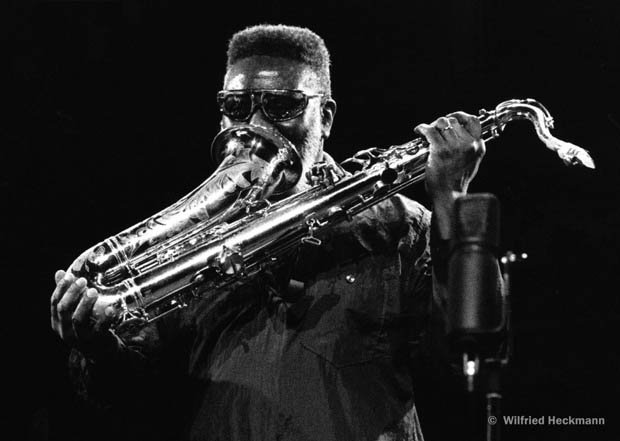LONNIE LISTON SMITH / “Astral Traveling”
By 1973, when jazz producer Bob Thiele signed keyboardist Lonnie Liston Smith to his (Bob’s) Flying Dutchman label, Lonnie had already played with a virtual who’s who of jazz legends including Art Blakey, Max Roach, Rashaan Roland Kirk and Miles Davis (whose band Lonnie was still technically a part of at the time). According to Lonnie, he learned something from all of the bandleaders he played with, but most formative to his sound was the time he spent with the otherworldly saxophonist and musical mystic Pharoah Sanders. Pharoah, in fact, was the direct link between Lonnie and Bob Thiele as Bob had worked extensively with Pharoah during their lengthy stint with the Impulse label—Bob as a producer and Pharoah as a sideman (with Coltrane) and later as a bandleader. Not coincidentally, Lonnie played on (and Bob produced) many of Pharoah’s best recordings, including my favorite two Pharoah Sanders albums, Karma (1969) and Thembi (1971).

Lonnie named his debut album as a bandleader Astral Traveling in deference to a tune of the same name which he’d composed and played on with the Pharoah Sanders band two years previous. In 1973, Lonnie re-recorded the tune with his new band, the Cosmic Echoes. The similarities and differences between the versions are revealing. The most obvious similarity is the spacey, spiritual vibe both versions share, a sensation (it’s more than a sound) which pervades nearly everything Lonnie recorded during the Seventies. It’s there in Lonnie’s trademark echoing keyboard sound (on both versions), but you can also hear it in the way the African and Eastern percussion ebbs and flows (also on both versions).
The differences are just as obvious, but also just as difficult to put into words. Lonnie’s “Astral Traveling” is airy, weightless and ethereal, rendered with such an effortless sense of grace that its hard for me to imagine the musicians performing the rhythms and notes without being in some sort of trance state.

Pharoah’s “Astral Traveling” is no less evocative, but is considerably more direct in approach. Perhaps due to Pharoah’s skill as a soloist (I don’t recall who it is playing the sax solo on Lonnie’s version, but he doesn’t approach Pharoah’s exquisite tone, expressiveness or control), Pharoah’s version sounds much more like a ‘song’ than does Lonnie’s version. It isn’t that Lonnie’s version is better—indeed Pharoah’s version has more to say (as the saying goes)—but on early weekend mornings when the sun is just beginning to rise and the house is still quiet and calm, Lonnie’s is the version I most like to hear.
Bonus tracks:
Pharoah Sanders – “Astral Traveling” (from Thembi, Impulse/MCA 1971); the original version of Lonnie’s tune, with Lonnie on keyboards
Lonnie Liston Smith – “Imani” (from Astral Traveling, Flying Dutchman/RCA 1973); proof that Lonnie and Co. could, if they wanted to, play as ‘free’ and ‘out’ as anyone else. Except ‘Trane. (I don’t want to get my Baba started.) OK, and Ayler. And maybe, the Sun Ra Arkestra. Oh, I give up.
—Mtume ya Salaam
more than meets the ear
Mtume, there’s a lot to talk about here, a lot more than I’ve got space or inclination to go into at the moment. That’s George Barron on saxophone doing his best to work out of a Pharoah bag, but he doesn’t quite make it. But, you say, well who else could have played the saxophone in this style? A bunch of people at that time, including one person in particular whom employed Lonnie Liston Smith for a number of years and made some very important albums with Lonnie on piano: namely, Gato Barbieri, out of Argentina. At another time I will post some Gato so y’all can hear what I’m talking about.
Lonnie had two issues to deal with: 1. Finding a horn player who could bring the fire like Gato and Pharoah did and 2. Figuring out what contribution that Lonnie wanted to make to the development of the music. Here is where Lonnie’s other famous employer comes in. Miles Davis was taking the music not only electric but pop (y’all remember last week I told y’all Mtume was a Miles freak—well you see he still at it ;->. Well, I suppose Mtume’s really showing you how deep his love of the Milesian way goes).
Lonnie Liston Smith also had a bit of sibling rivalry muddying up the waters in terms of his younger brother Donald Smith, who himself played mucho piano, I mean mucho, mucho piano. Make you forget about Lonnie Liston. Plus Donald could sing his ass off and also played a pretty mean flute. Flute and vocals is mainly what Donald did in Lonnie’s band. So you mix all those factors up and what Lonnie gets is an epic struggle to find his way out of a dense forest of contradictions and considerations.

To his credit, Lonnie does come up with the precursor to the Smooth Jazz sound. In fact, thinking about it a bit more, I believe he intentionally went light on the sax as a way to avoid the Pharoah/Gato ghosts clogging up the highway to his success as a band leader. After the Astral Traveling album, Lonnie Liston never again reverts to that kind of fiery saxophone work.
Speaking of saxophone, Pharoah Sanders is damn near a library in and of himself. He offers much to study upon. Again, in the interest of space, I will just point out that Pharoah had a tone on saxophone that to this day, over forty years later, remains one of the natural wonders of the musical world. His tenor sound was huge, but what he could do with the soprano was magical. The way he plays pristine lyrical tones and at the same time maintains a gritty-guttiness is amazing. Listen to Pharoah on “Astral Traveling.” He’s like a floating anchor, both luminous and dense as the sun, achingly clear and yet he’s got some kind of roughness up in his horn; he’s like an elephant dancing, and not just dancing, getting down. Yeah, that’s it: Pharoah’s sound is an elephant dancing—light on his feet but heavy as they come.
Now y’all know I got a Pharoah Sanders/Lonnie Liston Smith story. It was around 1970, a bunch of us drove over to Atlanta to attend the founding conference for the Congress of African People (CAP), which was the political organization that Amiri Baraka led in the early Seventies (although CAP started off as a coalition of a number of organizations with diverse leaders). One of the cultural presentations was the Pharoah Sanders Quartet. They played on a Saturday, if my memory serves me correctly. It was definitely during the afternoon, definitely in a gymnasium (probably at Morehouse). A bunch of other people were on the program but it was Pharoah who brought the fire and burned down the house. It was a truly magical performance.

At one point the drummer (I believe it was Clifford Jarvis) was beating on the sides of his drums. The bass player (who might have been Cecil McBee) was pulling at the strings with both hands. Pharoah had started the song out with a trumpet call like a bull elephant except he was playing tenor saxophone, I mean, it sounded like a bull elephant playing tenor saxophone. A huge, gigantic, crushing sound that woke you up and made you sit up straight and listen. So this music is blazing. Lonnie Liston solos first. So dig this, Liston reaches over with his left hand and grabs a drum stick from the drummer (without missing a beat mind you and still playing the piano with his right hand) and proceeds to take an audacious solo playing the piano keys with his right hand while simultaneously beating out counter rhythms on the top of the piano with his left hand (I know piano purists are cringing, but it was an awesome display, and I can only describe what he did, I can’t really describe the sounds he made in words). By now the musicians have the audience’s full attention. We are clapping, we are smiling, we are grinning, we are laughing; you know how it be when the music get good. So Pharoah comes in with his solo, playing so hard it sounds like he’s trying to break the horn with his breath and the horn is getting hotter, the stage lights hit it and it seems to be glowing, and Pharoah just plays harder and harder. We in the audience are stomping on the bleachers, bugged-eyed in wild disbelief. Goddamn. And at the end of his solo, just when it sounds like the horn was going to fly apart, Pharoah takes the horn out of his mouth and starts beating on his chest and screaming the last part of his solo. Literally. Beating his chests with his fists and screaming into the microphone. We holler back. We absolutely loose it and are up on our feet screaming back at Pharoah. I’m telling you. I was there. There ain’t no word in the English language to define this kind of music.
So, if you are Lonnie Liston Smith, after you leave that band and start out on your own, what in the hell do you do? What direction do you take? Well, I think what Lonnie Liston did was take all the lyricism, the song qualities that all three of his previous employers had (Gato, Pharoah and Miles) and emphasize that part and forget about trying to bring that fire, and hence Lonnie became a light show, soft lights.
Which is what I think of this remix of “Astral Traveling.” It’s a light show: the multi-percussion is flattened out into an electronic beat, the melody is reduced to a hook, and the saxophone solo is cut into fast food pieces. That said, it’s also the logical outgrowth of the path that Lonnie Liston choose. In fact had they mixed the Liston cut, it probably would have worked better, but anyway, that’s the way it goes and I still have yet to scratch the surface of what is going on here. I’m out….
—Kalamu ya Salaam
It's all relative
It’s not just a Miles thing, Baba. It’s also that I appreciate some ‘light’ and ‘smooth’ sounds for what they are. I don’t listen to them in spite of the ‘missing’ heaviness. I listen to them for what they are—I like the lightness.
Plus, there’s a bit of relativity at work. I remember a cat from the record store who used to buy Kenny G records. Eventually, he moved on to heavier sounds, like Fourplay, and told me something like, “I really like listening to jazz, but sometimes this stuff is so complicated.” (What can you say to that, other than ‘wow.’) So, for him, Fourplay is ‘heavy.’ I know another cat who worked at the store. He considered the entire Thembi album lightweight simply because most of it has the floating, mellow vibe to it. He, I’m sure, would appreciate your Pharoah at the CAP story. So, for him, Thembi is ‘light.’ Then there’s this cat I work with who listens to nothing but the heaviest, hardest rock music he can find. I’m talking speed-metal: early Metallica. Truly abrasive sounds like Rage Against The Machine, etc. He walked up to the car one day right before work while I was listening to the end of Coltrane’s “Out Of This World.” (By jazz standards, not exactly the most lightweight piece of music.) He waited for me to get out of the car and while we were walking into the yard, he asked me, half-joking, “How can you listen to that pussy music?” By that, he meant, ‘soft.’ ‘Light.’ ‘Fluffy.’ Which, to his ears, I’m sure it was. So, for him, Coltrane is ‘light.’
I’m trying to say that it’s all relative. We can get into the technical elements of what a musician is or isn’t doing. We can talk complexity v. simplicity. We can talk popularity v. obscurity. We can talk about training v. the lack there of. We can talk meaningfulness v. meaninglessness. But ultimately, we like what we like. For me, light sounds have meaning because I’m not heavy all the time, or even most of the time.
I remember Christopher Small talking about this once. After a very long dissertation on the definition of music (or, more precisely, dueling definitions of music), he finally boiled it down to this: ‘music’ is anything that any group of human beings accepts as music. ‘Heaviness,’ ‘lightness’ or whatever/however else we describe the depth of meaning we assign to something is both very relative and very personal. When I want heavy, believe me, I know where to find it. But when I want lightness, I know where to find that too.
BTW, I like the remix a lot. And I think you're correct when you say that's the direction Lonnie was taking his music. It's a chillout vibe, which, when done well, I tend to dig immensely. I think you're wrong though, about Boozoo Bajou being better off remixing Lonnie's version. I don't think it would've worked. Lonnie's version already has that chillout kind of feel. If they would've mixed that track, there would've been a complete lack of friction. (Which is what I find annoying about 'bad' chillout music.) I think they picked the right track to re/mix and I think they did a hell of a job.
—Mtume ya Salaam
This entry was posted on Sunday, December 18th, 2005 at 1:00 am and is filed under Cover. You can follow any responses to this entry through the RSS 2.0 feed. You can leave a response, or trackback from your own site.
One Response to “LONNIE LISTON SMITH / “Astral Traveling””
Leave a Reply
| top |